What is Sales Intelligence?
Sales intelligence is any information businesses collect to make sales easier. It includes a range of tech solutions that help sales and marketing teams discover, analyse, present and use B2B data to make more informed decisions. The overall purpose is to gain more insight into potential customers.
Scroll or use the menu below to discover more about the benefits of sales intelligence, the software and data that powers it, and the best platforms on the market. 👇
Advantages of using a customer intelligence tool | Sales intelligence and closing deals | How sales intelligence works | Business intelligence sales | Sales intelligence and the sales process | Sales intelligence for sales teams | Data for sales intelligence | Choosing a sales intelligence tool
What are the benefits of sales intelligence?
Sales intelligence delivers massive benefits to your sales and marketing teams by providing B2B data in an easily understandable way.
Here are five sales intelligence benefits 👇
Of course, the proof of these benefits is in the pudding and with call intelligence solutions like Cognism or ZoomInfo, there are lots to go around!
1. Accurate data
Imagine how easy sales would be if you never hit a dead end and could reach the people you needed to talk to in one shot.
SaaSLeads don’t have to imagine any longer. They used Cognism’s Diamond Data® to book 80% of their demos, contributing to over £0.8 million of new business in Q1 2022.
Here’s what they said about using sales intelligence to win more deals:
“We’ve been a Cognism client since January 2022 and have a sales cycle of approximately 45 days. In Q1 2022, we closed £0.8 million. I don’t know exact figures, but many of the closed-won deals are attributable to Cognism’s premium data.”
2. Quality leads
Growing your pipeline is everything in B2B sales, but you can’t scale your pipeline without quality leads.
Localz is no stranger to using sales intelligence to grow its pipeline by 500%. This is just one of the many advantages the company experienced using Cognism.
They said:
“From October to April 2022, our outreach has grown 180%, and opportunity generation has rocketed to 500%. This is because we’re targeting the right people at the right time.”
3. Fast, predictable prospecting
Sales intelligence companies are notorious for helping teams prospect better and faster. One of the reasons is that many of them follow strict data compliance laws to ensure your teams aren’t calling anyone who has expressly asked not to be called.
Promon prospects confidently because they use Cognism’s compliant data to book 33% of new business meetings in Southern Europe and save ten hours on administrative tasks weekly!
Here’s what they have to say about the benefits of using business intelligence for sales:
“You’ll be hard-pushed to find another platform that saves time and delivers results. It’s a lifeline for a BDR, and I couldn't recommend it enough.”
4. Identifiable intent
Sales business intelligence lets you identify accounts actively searching for your product or service via intent data.
Using intent data, Keboola targets 20 potential customers a week. Out of those, at least two are ready to enter the sales funnel - a far cry from the lists of dead numbers they used to call.
Here’s how combining "who" with "when" changed the way Keboola sells:
"I believe Cognism is unique in providing the full package of intent data and Diamond Verified Data®. It’s a game-changer. We now have the right tools armed with the right data to make the biggest impact."
5. Accelerated sales cycles
Sales intelligence gives you everything you need to make fewer calls, contact the most relevant people, and hit quota faster.
Drift extensively tested all the leading tools on the market before deciding on Cognism.
Why?
Because it did everything it promised, including delivering ROI in just thirty days!
They said:
“There are many data enrichment tools out there, and we’ve tried most of them. We can confidently say that Cognism has the highest coverage and most accurate data available.”“For these reasons, we could easily sell the tool internally and get buy-in from senior management. The cost versus the value of what we are getting is very high. We couldn’t be happier with it.”
💡 Interested in learning how much a tool like Cognism costs? Have a look at our pricing.
How does sales intelligence help you close more deals?
Now you know why you want to use sales intelligence for your business, how do you use it to close more deals?
Intelligence tools help boost closed-won deals in seven key ways:
1. Discover your Total Addressable Market
Your Total Addressable Market (TAM) is the total amount of revenue your B2B product or service can bring in.
It’s usually a revenue figure, but sometimes organisations express their TAM as the number of companies that have the potential to become customers. Businesses must know their TAM to:
-
Define budgets.
-
Forecast growth.
-
Segment their audience into smaller groups for marketing.
Knowing who is in your TAM keeps your sales team on track and stops them from wasting time trying to sell to people who don't need your product.
Using the bottom-up method, sales intelligence solutions can help define accurate TAM.
Using your sales intelligence platform, you can analyse your existing client base, look for trends and create and match buyer personas based on those trends.
Discover your TAM with Cognism’s free calculator 👇
2. Determine buying signals
We mentioned that one of the benefits of using sales intelligence solutions is closing deals faster. Determining buyer signals can help your SDRs achieve this by only reaching out to prospects who are ready to buy.
Sales intelligence monitors company websites, news sources, social networks and more to identify marketing and sales trigger events that could signal that prospects are interested in buying.
For example, if a prospect has just raised a new round of funding, they may have the budget to spend. Once you have this information, your salespeople can get in touch and make a deal happen.
3. Gain real-time insights with intent data
Intent data is behavioural data on a company level. It shows when a target company researches your solution online by analysing the websites they visit and what they do when they get there.
Like buying signals, intent data inform sales teams when prospects will be the most receptive to their messages so you can slide into their inbox before your competitors do.
Watch this video to learn more about how your intelligence platform can use intent data to create more opportunities👇
4. Work smarter with CRM integrations
If you want better revenue numbers, the first step is to ensure your reps save time while being more productive.
Sales intelligence supports this by integrating with your existing tech stack and providing all the information your sales team needs in one place.
The result?
No more duplications, better organisation and less time spent on manual, repetitive tasks.
For example, your sales intelligence solution should integrate with most CRMs, so you never have to switch screens to use any of your different sales tools.
Secondly, you can set up software like Cognism to enrich your contact database automatically. This way, your team is always prospecting to the right people with the correct numbers.
5. Enrich your existing data
The more you know about a prospect, the easier it is to sell to them. Detailed information can help you find the right angle to craft a message that resonates with their pain points.
However, most CRMs aren’t kept up to date with complete and accurate data. B2B is constantly changing. People get new jobs, and companies merge and change ownership.
If your CRM isn’t up to date, you could miss important opportunities to reach out and close deals.
A sales intelligence platform fills these gaps and ensures all your contact information is up-to-date. It also gives you a new dimension of information, including financial insights, such as funding rounds and company news. So your sales team can grab new opportunities to get in contact and sell.
💡Not sure how to use sales intelligence to enhance your B2B database? This interactive workflow showcases how to enrich Sales Navigator results with actionable contact data.
6. Improve your sales strategy
Successful sales teams plan for the future and allocate their resources in a way that maximises revenue. Sales intelligence can be an integral part of this, giving sales leaders the ability to forecast more accurately, formulate more effective strategies and drive more growth.
Sales intelligence excels in helping sales leaders better understand their prospects and customers, who they are, and how and why they buy. It provides the data that allows sales leaders to shorten the sales cycle and close more deals.
7. Enhance the customer experience
Forcing modern B2B buyers to engage with salespeople a certain way won't win you any leads. Instead, buyers want to do their own research and then meet with a company when they decide what they need.
Today’s B2B salespeople need to be just as good with video, email and social media as they are on the phone. As a result, companies that provide the best B2B customer experience often win the deals over their competitors.
Sales intelligence can help you meet your prospects’ expectations and lead them to become customers. The more you know about your prospect, the easier it is to craft a message that resonates with them - and sales intelligence gives you all the information you need to connect with them on a meaningful level.
With sales triggers and intent data, sales intelligence helps you pick the moment when the prospect may be excited that you called. Then, all you have to do is demonstrate that you can solve their problem.
How does sales intelligence software work?
Sales intelligence software works by continuously crawling millions of publicly available websites, gathering relevant data, and matching it to profiles in its database.
Simple-to-use platforms allow salespeople to search, analyse and evaluate sales data.
When you bring sales intelligence into your B2B sales team, it helps you deliver numerous tasks more effectively, such as:
-
Generating sales and marketing leads - With sales intelligence software, you can use data to create lists of individuals that match your ideal customer profile (ICP). You can also create lists of profiles that are similar to your existing customer base. It’s lead-generation gold.
-
Setting up sales trigger alerts - Sales intelligence provides real-time data on your prospects. If an event happens that you need to know about, it'll notify you.
-
Enriching and cleaning your existing customer data - Sales intelligence refreshes your historical customer data and fills in any missing gaps.
-
Personalising your sales strategy - The more you know about a prospect, the more you can tailor how you sell to them. A personalised sales approach often yields higher-quality leads and more conversions.
-
Conducting market research and gaining insights - Knowing how many potential leads are out there, you can forecast and allocate resources more accurately. You can also keep an eye on your competitors.
How does sales intelligence work with your CRM?
Your customer relationship management (CRM) system plays a valuable role in maximising the value of your sales intelligence software.
To get the most from the detailed, accurate data that sales intelligence solutions produce, you need somewhere to store it.
Your CRM is the digital filing cabinet that makes this possible.
Once it’s stored and available to access and edit, you can use it to identify new business and reach your prospects when they’re ready to buy.
You might be wondering, what's the difference between sales intelligence, CRM software and business intelligence? Let's clear that up:
What's the difference between sales intelligence and CRM?
Customer Relationship Management (CRM) helps businesses log and administrate customer interactions.
Sales intelligence helps sales and marketing teams discover, analyse, and utilise data relating to prospects and customers.
So while the two work hand in hand, they are distinct from one another.
When choosing a sales intelligence solution, ensure it integrates with your CRM. You shouldn’t need to synchronise the two programs manually, and your sales intelligence may work as a plug-in inside your CRM without switching windows.
Once your sales intelligence software and CRM are talking to each other, you should be able to import and locate the new data in your CRM. For example, you could use sales intelligence to create a list of leads that match your ICP in a particular sector and then transfer it to your CRM.
Your CRM's data points will vary depending on your selected sales intelligence solution. But you should find the following basic information:
- Name and contact info.
- Job title and level of seniority.
- Company information (size, location)
Sales intelligence can also show you better, more helpful information, including:
- Sales triggers – opportunity alerts signalling prospects might be ready to buy.
- Intent data – prospective buyers currently searching for your product and ready to enter your sales funnel.
Armed with this kind of information in your CRM, you can go to these prospects with a message that will resonate.
💡 See how it works. Learn how to identify accounts searching for your product or service in your CRM.
Using sales intelligence with your CRM
With data gathered from sales intelligence in your CRM, you get four key benefits:
1. Complete visibility of your sales intelligence dataYou can manipulate data to find new opportunities using your CRM's filtering features.
2. CRM analytics to create reports that bring the data to lifeThe more you know about a prospect or customer, the better you can position your product as the solution to their pain.
Combining sales intelligence with your CRM gives you the ultimate customer insight, giving you an accurate picture of your prospect’s journey with your company.
3. Automated processes that save time and improve the accuracy of outreachFor example, if a contact in your CRM displays an intent to buy in your sector, you can alert your salespeople. They can then swing into action, running outreach cadences to contact the prospect and promote your product as the answer to their problems.
4. Sales intelligence solution and CRM integration to ensure the most up-to-date dataData deteriorates quickly as the industry constantly grows and changes. Bad data can derail ABM campaigns and cause salespeople to waste time chasing prospects that don’t exist.
Sales intelligence eliminates this problem in your CRM, automatically enriching your data to ensure it’s as accurate as possible.
With sales intelligence in your CRM, you close more deals faster.
Cognism integrates with all major CRMs. Why not give it a try with 25 free leads to start? Click the banner to learn more 👇
Sales intelligence vs business intelligence: what’s the difference?
Business intelligence covers software and other tools companies use to gather, store and analyse data on their business and their industry. Companies can use business intelligence to make better short and long-term business decisions.
Examples of business intelligence applications are tools that take data, process it, and make it presentable via dashboards, reports and charts.
The definition of sales intelligence is the range of tech solutions that provide data to salespeople and marketers in the B2B space only.
Sales intelligence helps sales and marketing teams make the best use of data relating to prospects and customers. A good example would be a B2B data provider like Cognism, which provides up-to-date contact data for prospects, that marketers can target with relevant content and salespeople can call to convert.
However, as much as these two tools are similar, they do have differences. There are five significant differences between sales intelligence and business intelligence:
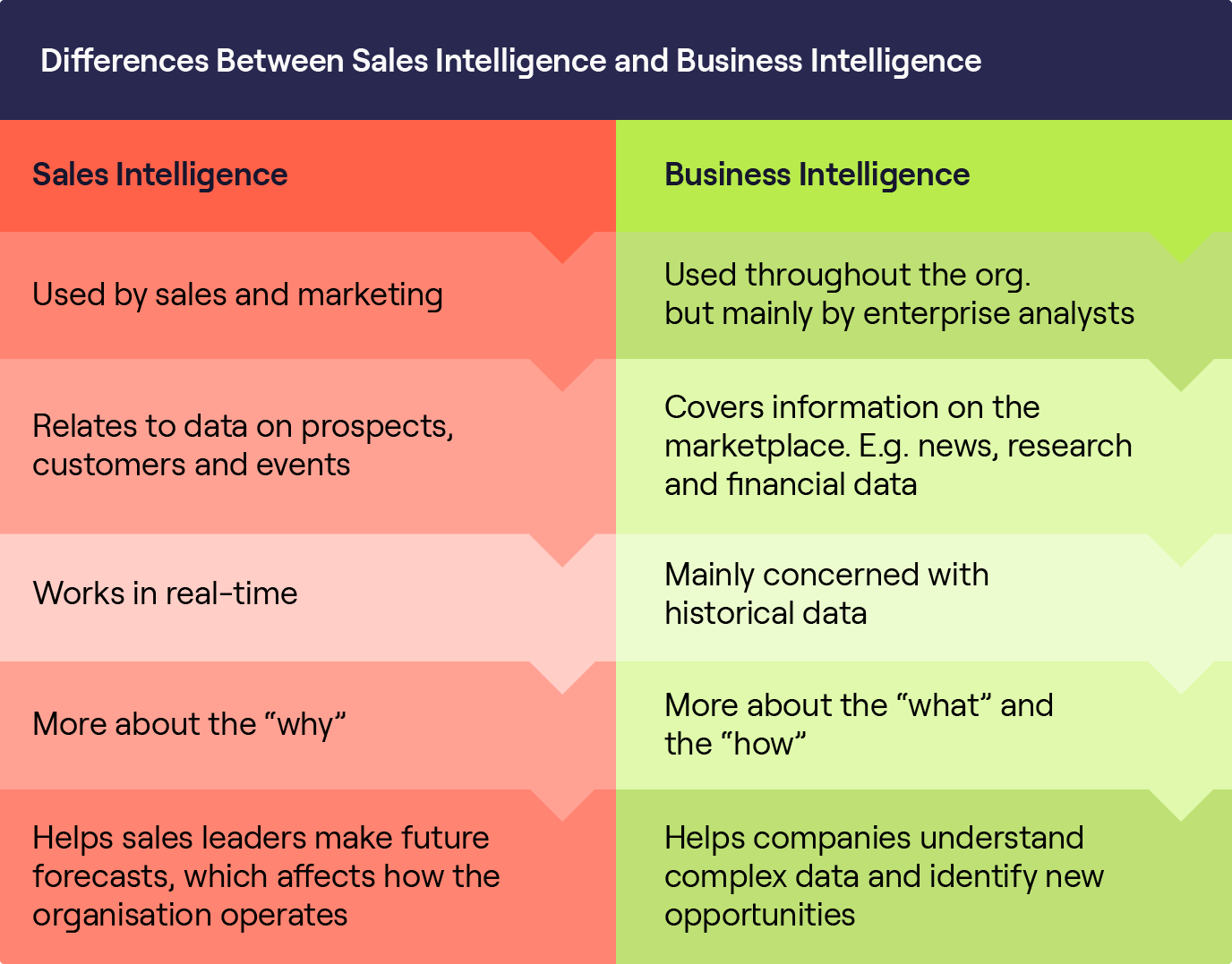
While there are significant differences between sales intelligence and business intelligence, some connections and overlaps lead to confusion between the two terms.
Let’s outline some similarities:
Firstly, both solutions deal with data, just different types of data. Leadership teams will use both to make decisions that have far-reaching effects across the business. So it makes sense to implement each tool as part of your overarching data strategy.
Next, on a strategic level, sales and business intelligence support each other – and vice versa. Business intelligence tools give you data that shows how your business is performing (good or bad). When you analyse it correctly and combine it with sales intelligence data, you can determine why your business is performing the way it is, make forecasts for future revenue and act on them.
Finally, when you get these tools working together on a tactical level, you’ll increase sales, and your business will perform better.
For example, if you find out that a company that could be a good fit for your product has just raised a new funding round (BI), your sales team can grab the contact details for the CMO (SI), make contact and start a relationship.
How does sales intelligence boost the B2B sales process?
Sales intelligence makes these three areas of your sales process more effective:
1. Creating an ideal customer profile
No B2B company can succeed by being all things to everyone. Companies must begin by targeting a narrow niche (the narrower, the better) and dominating that space until they can use it as a base to expand.
Sales and marketing teams should work together to create an ideal customer profile (ICP), leveraging sales intelligence to make it work. By analysing your current customer base, you can use sales intelligence tools to find commonalities and create lists of target companies and individuals that fit your ICP.
For example, if your ICP is VPs of Marketing in EMEA-based companies with less than 50 people, sales intelligence will create a list of people that fit the bill exactly. It will also give you their mobile numbers, email addresses, and other relevant information.
Then, your marketing team will be able to warm them up with relevant, personalised content.
2. Lead scoring
Once you’re at the stage where you’re engaging with your prospects with personalised content, sales intelligence can help you determine who is genuinely interested and who has you on ignore.
Sales intelligence tools can monitor your prospects’ responses, such as opening an email, reading it to the end, or downloading additional content. They can then assign each prospect a score, showing your marketers which pieces of content work best and who your salespeople should be reaching out to.
This is called lead scoring. Having this kind of B2B data at your fingertips takes the guesswork out of the sales process.
3. Qualification, messaging and outreach
Once your leads are sufficiently warmed up, it’s time for the sales team to take control - with sales intelligence to help them.
Your SDR's first task is to call the prospect, begin the conversation and qualify them in or out of the process. B2B sales intelligence tools ensure they have the correct contact data, so they’re not wasting their time trying to get hold of prospects who have long since moved on.
In addition, because sales intelligence discovered these prospects when working with the ICP, salespeople know they’re calling similar prospects who face similar challenges. It’s suddenly easier for salespeople to get their messaging right and truly position your product as the answer to your prospects’ pain.
Finally, sales intelligence tools can perform another valuable task - making sure salespeople reach out when the prospect is most receptive.
Sales intelligence tools monitor millions of data points to identify sales triggers, such as a company raising a new funding round or appointing a new CEO, which signals that a prospect may be interested in buying. Once your sales team discovers these sales triggers, they can launch into action.
How does sales intelligence help salespeople perform?
Sales intelligence streamlines the sales process, but it also affects sales performance in four key areas overall:
1. Boosting productivity - Because sales intelligence instantly gives salespeople the correct contact details for their prospects and customers, they can have more sales conversations across the day.
2. Better connections - Sales intelligence helps salespeople understand when a prospect is most likely to be interested in what they have to say. Then, when speaking with the prospect, sales intelligence helps them craft a message that resonates.
3. Shorter sales cycles - Rather than wasting time contacting buyers when they're not in a position to buy, sales intelligence leverages data to alert the salesperson to that all-important moment when they have the intent to purchase. This means the time between first contact and winning the deal is much shorter.
4. Cleaner customer data - Sales intelligence ensures you always have the most up-to-date information on your customers, even after they’ve signed up with you. This information is essential when it’s time to renew.
5. Identifying areas to improve - Sales intelligence produces data on the effectiveness of sales and marketing strategies. Business leaders can quickly determine what is or isn’t working and experiment with ways to improve future performance.
Watch this video to learn more about the benefits of quality sale intelligence data for your sales teams 👇
Sales intelligence data FAQs
Sales intelligence platforms gather business data on a vast number of individuals and organisations.
Q. Where does sales intelligence data come from?
From millions of public and private sources. The best platforms present data in a way that’s simple to understand. The data is already available, but sales intelligence software saves time by bringing it together in one place.
Q. What can revenue teams do with this data?
Armed with this data, B2B sales and marketing teams can be more effective at identifying prospects and reaching them at the right time with the correct personalised approach.
Q. What are the key data points in sales intelligence?
Depending on your sales intelligence platform, you can find information on potential customers, including name, job title, email address, telephone number, and more.
The best platforms will also show you real-time data indicating their interest in purchasing, such as financial figures, new funding rounds, and new appointments.
They will also provide insights into the buying intentions of your leads. This type of data, called intent data, is invaluable for salespeople who want to know exactly when a prospect is looking to purchase your solution or that of a competitor.
Q. How do these data points help on a practical level?
Teams can build lists of leads to target with content or give to salespeople to cold call.
Sales intelligence greatly benefits sales and marketing teams, helping them gain a competitive edge. The teams with the highest-quality data presented most effectively will have a considerable advantage over their rivals.
Q. Why is data vital to sales intelligence?
Data is the fuel for sales intelligence.
To get the best results from your sales intelligence platform, you need the best data available – rich, accurate, and up-to-date.
Make sure you choose a sales intelligence platform that gives you the most detailed picture of your prospects.
You can get much more than a contact’s name and job title with the right data. You can access their work email address, mobile phone number (which is invaluable now many prospects work remotely), and more. At an organisational level, you can even discover what sales tech solutions they use.
Your data should be as accurate as possible. Incorrect data will only waste your salespeople’s time, making them less effective. Choose a data provider that prioritises self-entered data, as this is more likely to be accurate. The best data providers use artificial intelligence (AI) to gather and check the reliability of their data.
Having data that is as recent as possible boosts its accuracy. Real-time data will help your sales reps to contact the best prospects at the right time.
If you’re wondering. Cognism has all this and more 😉
Choosing a sales intelligence tool
There’s a wide range of products in the marketplace. This makes finding the right B2B sales intelligence product for your needs difficult.
How do you possibly choose?
Here’s a mini guide to help get you started:
What do you want to achieve?
The first thing to do is assess what you need from your new sales intelligence tool.
Different solutions work slightly differently, so it helps to know which features will bring you the most essential benefits.
Which of these features will help you the most?
-
Lead generation - create lists of possible future customers.
-
Sales qualification - identify the prospects most likely to buy.
-
Data enrichment - update existing customer records in your CRM.
-
Trigger data - identify the right time to contact prospects, when they will most likely buy from you.
Identify the outcomes you want to prioritise and choose a tool to help you deliver them.
How to investigate the market
You’ve learned what you need from your sales intelligence tool. Now, how do you begin narrowing it down?
There are three steps to take:
1. Look at software review sites
A great place to start is to visit sales software review sites such as G2, Capterra and TrustRadius.
G2 lets you filter the entire sales tech market by function - so you can easily find a list of every sales intelligence tool available. You can rank that list by price, popularity and, perhaps most importantly, customer review score.
Then, go deeper and read what real customers thought of each product, what works well for them and what doesn’t.
2. Visit company websites and social media
It’s best to visit the websites and social media feeds for each tool you’re interested in.
Get a feel for the product by watching videos, reading articles and seeing how they promote their solutions. Check if your preferred provider has a YouTube channel - an excellent resource for quickly uncovering information.
3. Talk to your network
Remember the B2B sales adage - "people buy from people."
Ask your contacts in the industry about the tools they use and if they like them. You’re more likely to get an honest opinion from a friend or colleague.
Questions to ask your provider
Once you've narrowed down your shortlist, it’s time to start engaging with sales teams.
Finding the best sales intelligence tool for you is all about asking the right questions based on the outcomes you want to achieve. Here are seven questions to ask when you're on a call or demo:
1. How accurate is your data?
The more accurate your data, the more effective it is. On the other hand, data deteriorates quickly. Ask how they source their data and how often it gets refreshed.
2. What can I do with your data?
Make sure your software has the features you need. For example, if you want to create lists that match your ICP, find out what filters you can use to segment your data.
3. What insights can your data give me?
If discovering sales triggers or gauging intent is a priority, ensure your sales intelligence tool can provide the necessary information.
4. How complete is your data?
How in-depth will your data provider go? For example, some tools may tell you what sales tech a company uses; this can be dynamite information in B2B. But not all tools may give you that level of detail. Ask this question to determine how far your provider's data can stretch.
5. Is your data compliant?
Ensure your sales intelligence tool complies with GDPR and all other data regulations. The penalties for non-compliance can be severe.
6. How much does it cost?
Your sales intelligence tool is an investment, so work out possible returns. Like most things in life, you get what you pay for. Avoid going for the cheapest option; when it comes to B2B tech, benefits, features, and ROI are more important than price.
7. On average, how soon do your customers see ROI?
When buying new tech for your team, you'll want to ensure the tool will give you the swiftest possible return. Asking this question will allow you to judge based on the only thing that matters in B2B - the bottom line.
What are the best sales intelligence platforms?
Choosing a sales intelligence tool that works for your business in a crowded market can be challenging. Discover 27+ of the best sales intelligence tools on the market right now.
Hit quota every month with Cognism
We’ve got the answer to all your sales woes - sales intelligence software, Cognism.
With Cognism, you can:
- Identify ideal fit accounts.
- Bypass the gatekeeper.
- Prioritise buyers who are ready to buy.
- Find net new leads AND enrich existing contacts.
Click 👇 to arrange a demo.
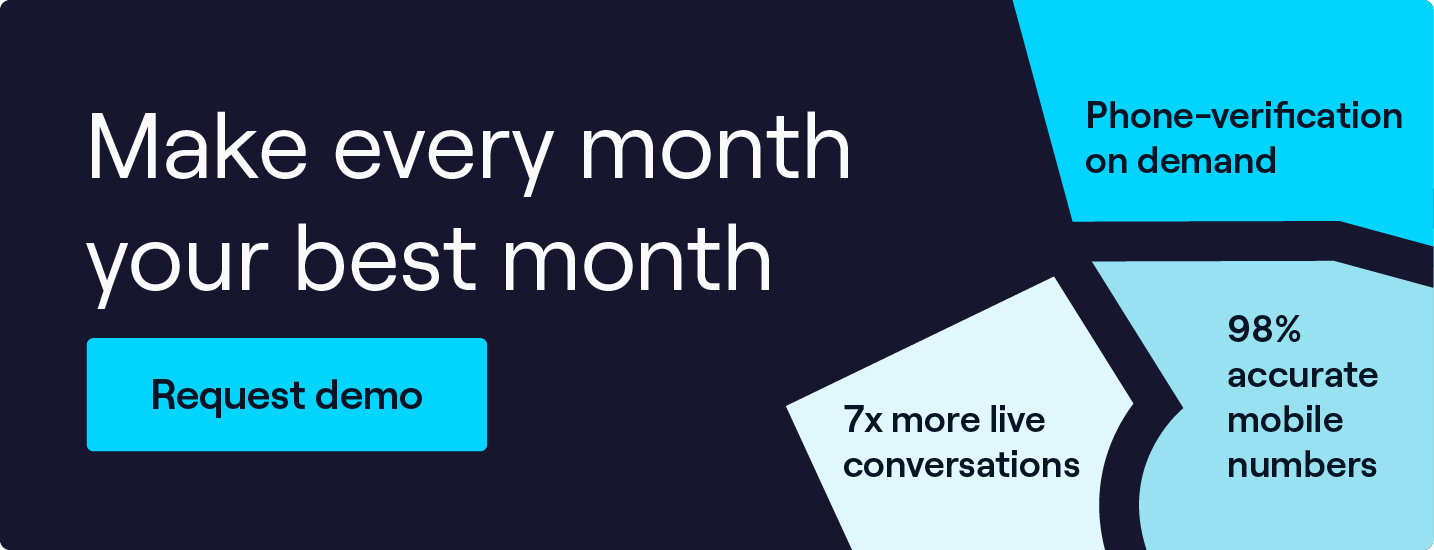
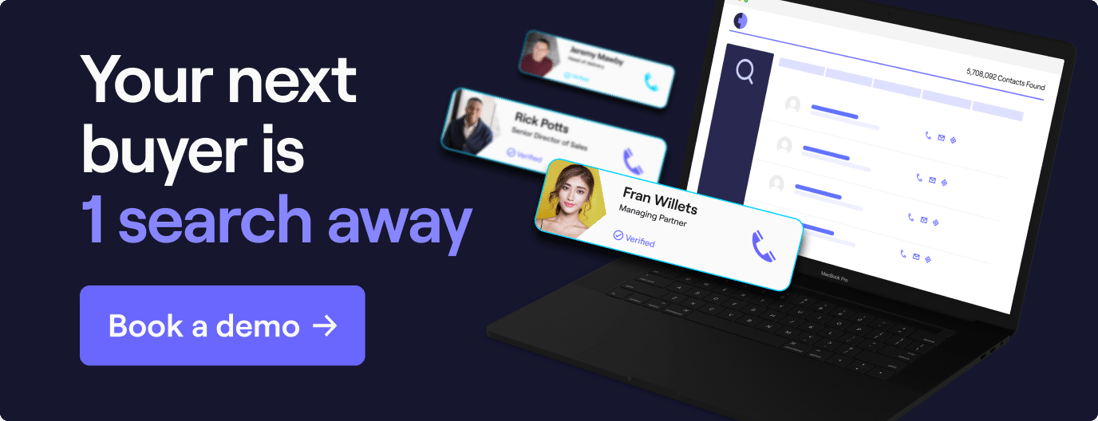
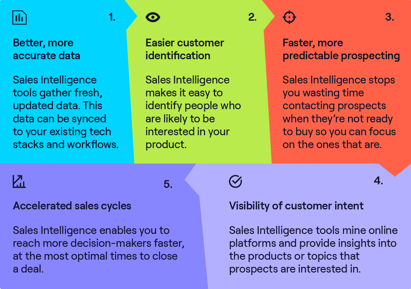
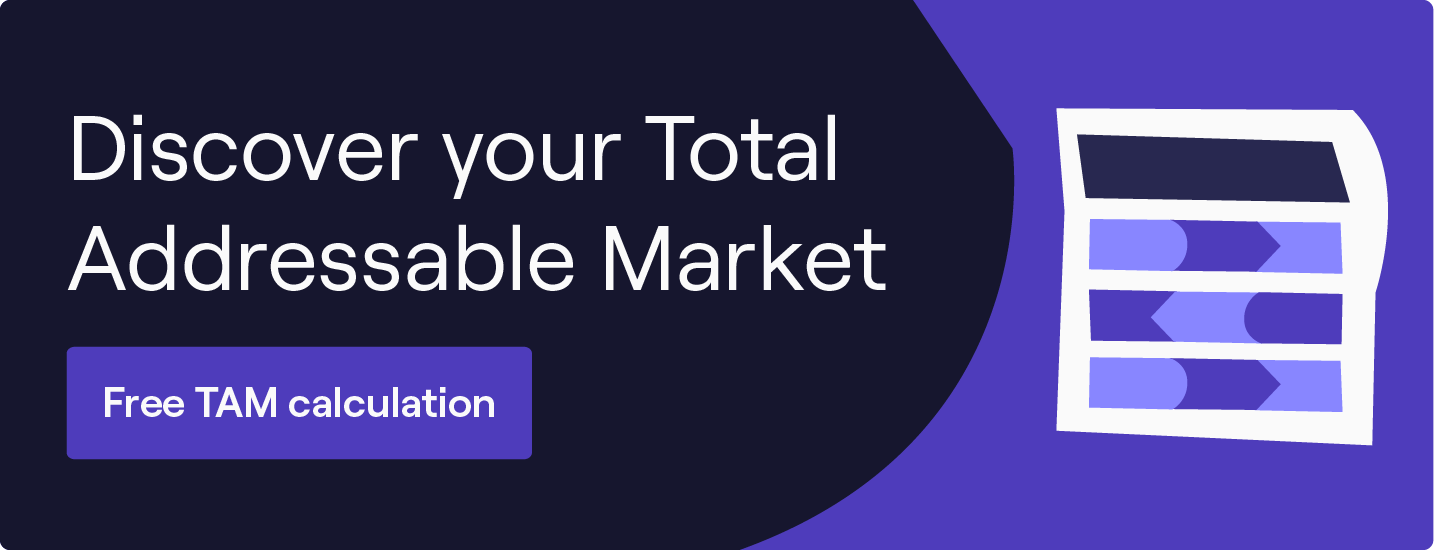
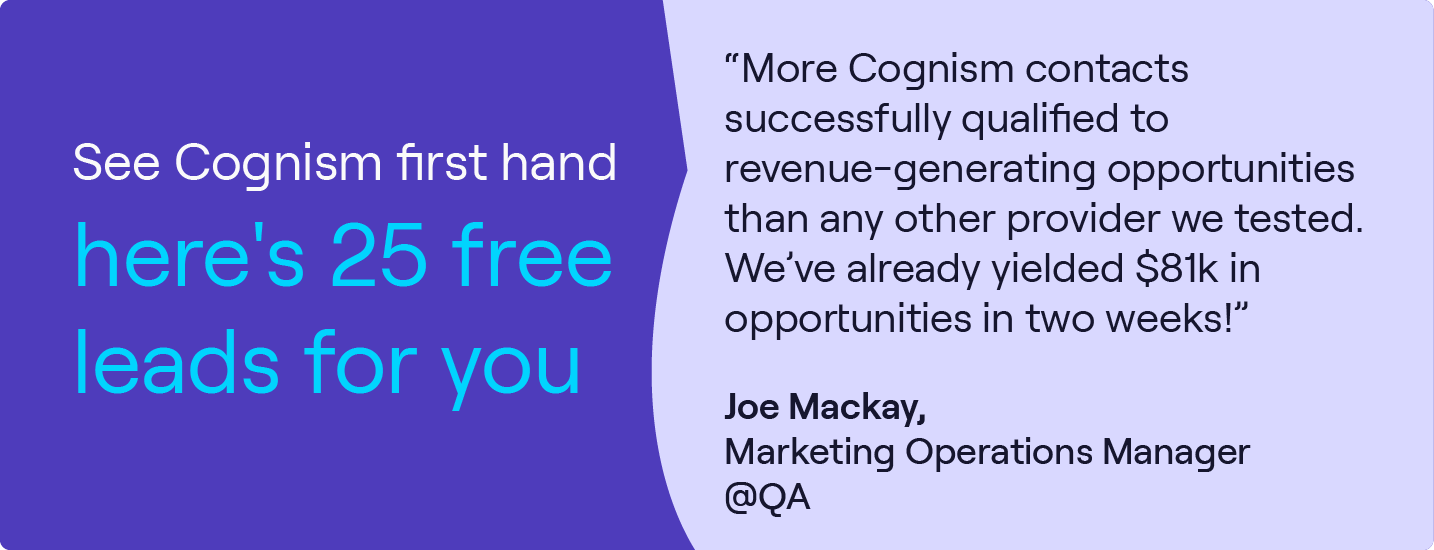
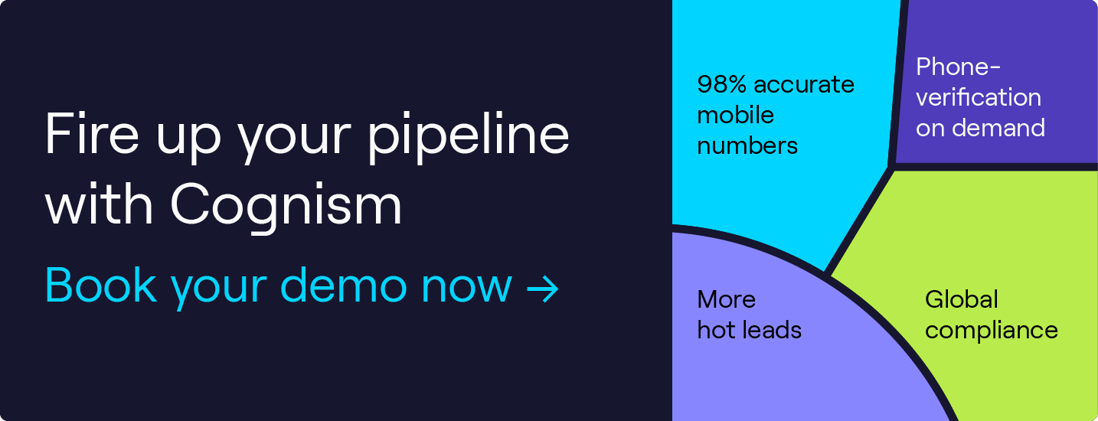
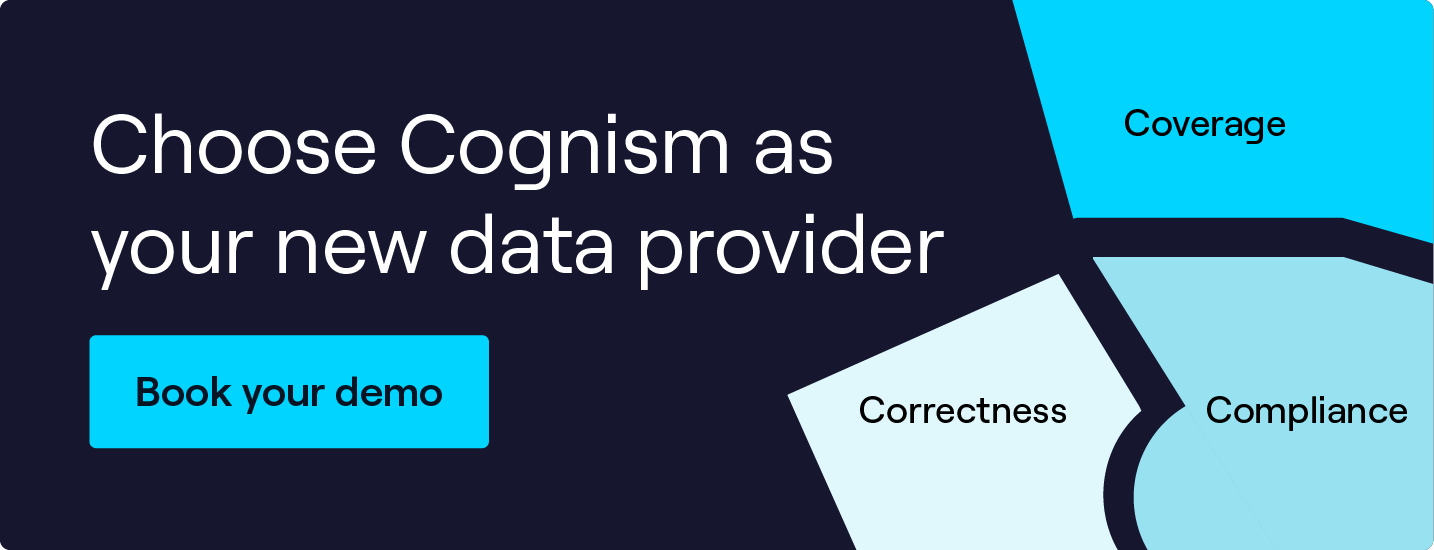
dfe4.jpg)